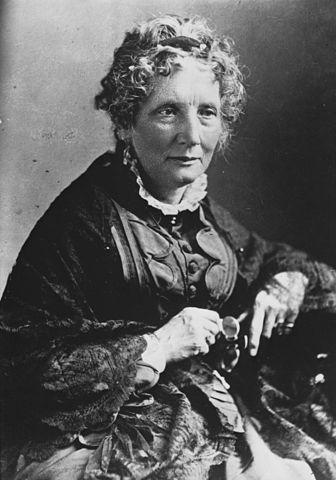Author Bibliography (in progress)
Stowe, Harriet Beecher (1811-1896)
BIOGRAPHICAL NOTE
 Harriet Elisabeth Beecher was born on 14 June 1811 in Litchfield, Connecticut, and died on 1 July 1896 in Hartford, Connecticut. Catharine Beecher was her older sister. Best known for her writings in support of the abolition of American slavery, she also supported rights for married women. In her longer works, she compares the status of non-human animals to that of women. Stowe’s animal ethics are welfarist; she repeatedly criticizes killing for killing’s sake or for entertainment, as opposed to the killing habits of prey animals that are natural and therefore more morally justifiable than the hunting habits of some humans. In her non-fiction, and some of her fiction, she argues that in the US it is possible to take pleasure in a vegetarian diet, such food being plentiful and abundant. With her sister Catharine, she argues that meat is less healthy than vegetables. Meat is a stimulant; that is, it is not intoxicating to the same extent as alcohol, but it nonetheless belongs to the same category of products. There is also a practical argument in favoring vegetable over animal food; meat requires more time and effort than vegetables to be palatable.
Harriet Elisabeth Beecher was born on 14 June 1811 in Litchfield, Connecticut, and died on 1 July 1896 in Hartford, Connecticut. Catharine Beecher was her older sister. Best known for her writings in support of the abolition of American slavery, she also supported rights for married women. In her longer works, she compares the status of non-human animals to that of women. Stowe’s animal ethics are welfarist; she repeatedly criticizes killing for killing’s sake or for entertainment, as opposed to the killing habits of prey animals that are natural and therefore more morally justifiable than the hunting habits of some humans. In her non-fiction, and some of her fiction, she argues that in the US it is possible to take pleasure in a vegetarian diet, such food being plentiful and abundant. With her sister Catharine, she argues that meat is less healthy than vegetables. Meat is a stimulant; that is, it is not intoxicating to the same extent as alcohol, but it nonetheless belongs to the same category of products. There is also a practical argument in favoring vegetable over animal food; meat requires more time and effort than vegetables to be palatable.
PUBLICATIONS
Household Papers and Stories. The Writings of Harriet Beecher Stowe. Vol. VIII. Boston: Houghton, Mifflin & Co., 1896-1897.
“Olympiana.” Lady's Book Vol. XVIII no. 6 (June 1839): 241-243.
https://archive.org/details/palmettoleaves00stow_1/page/n7/mode/2up
Pink and White Tyranny. A Society Novel. Boston: Roberts Bros, 1871.
“Rights of Dumb Animals.” Hearth and Home (2 Jan. 1869): 24. Rpt. Our Dumb Animals Vol. 1 no. 2 (February 1869): 69.
Stories About Our Dogs. Edinburgh: William P. Nimmo & Co., 1882.
Sunny Memories of Foreign Lands. London: Routledge, 1854.
Last updated on August 8th, 2024
SNSF project 100015_204481
@VLS@veganism.social | VeganLiteraryStudies | @veganliterarystudies |
